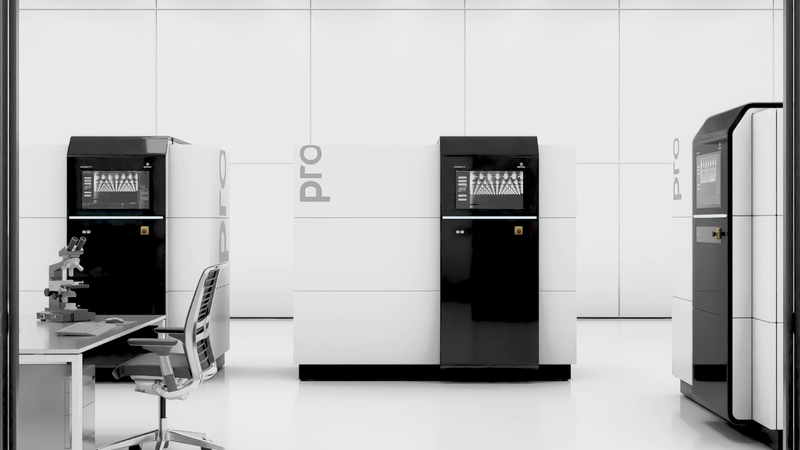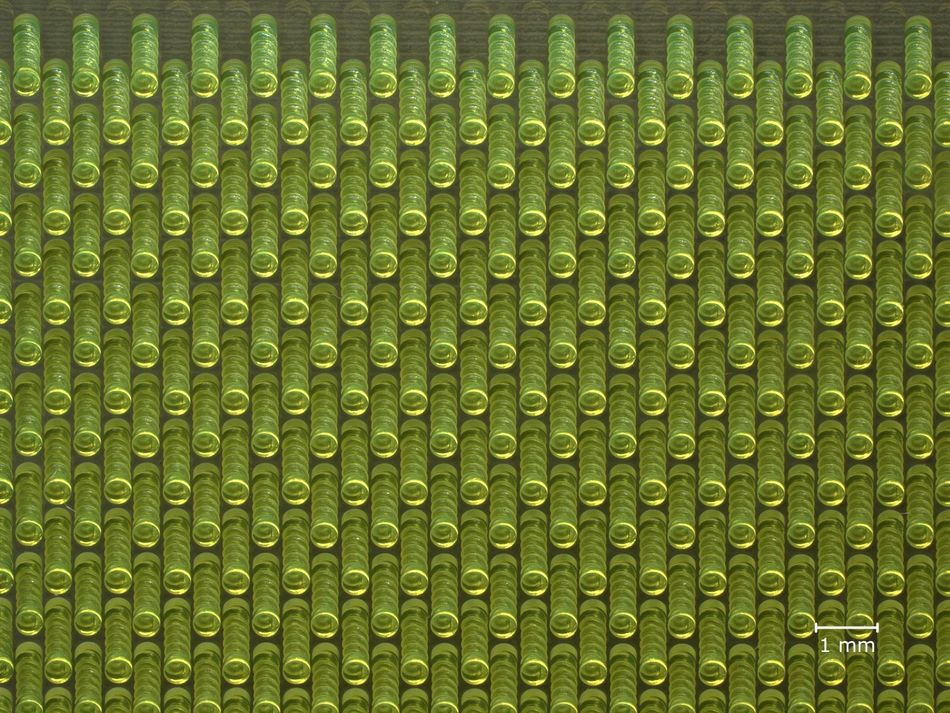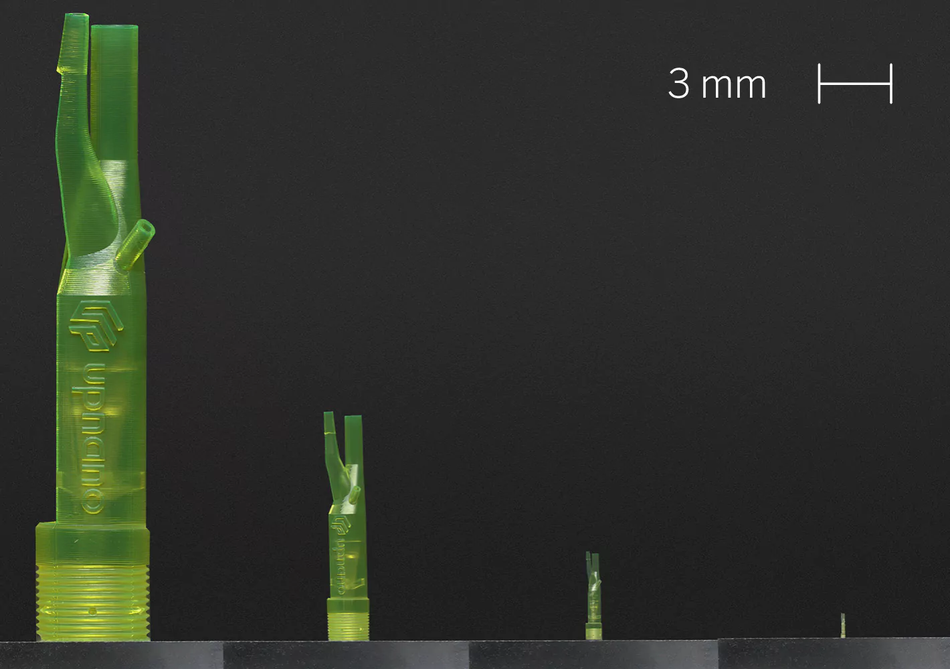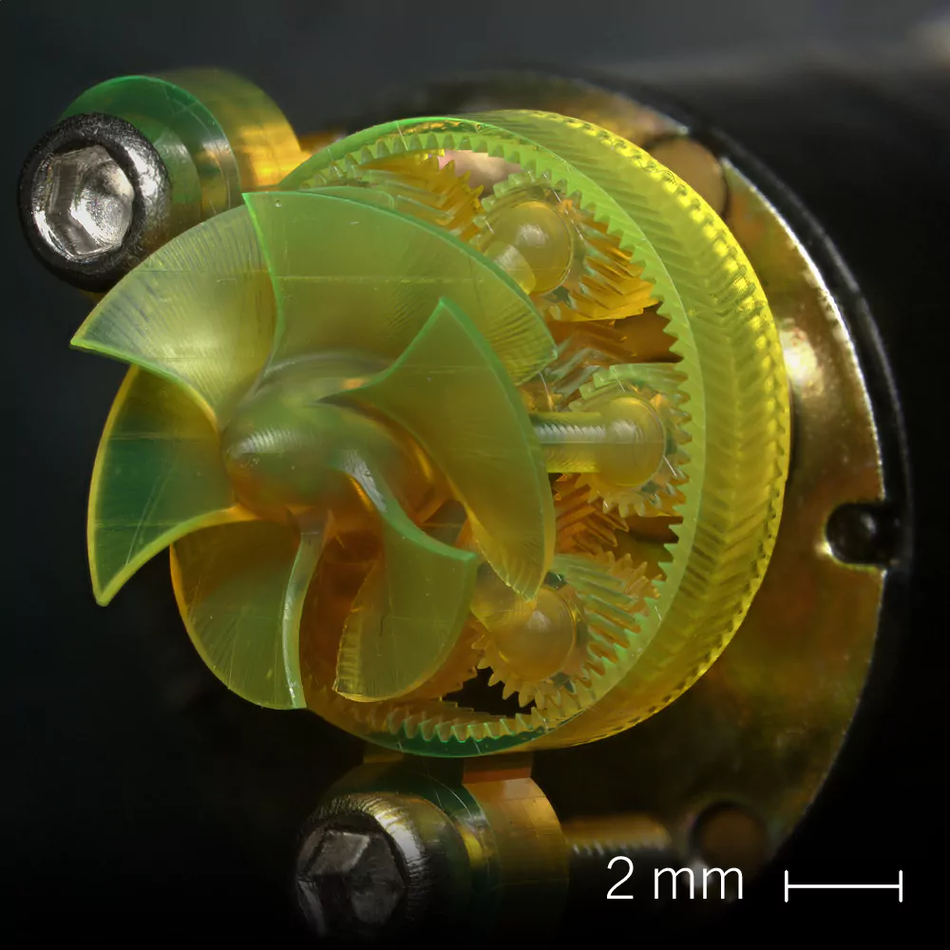One Small Part for Manufacturing, One Giant Leap for Microfabrication: The New Service Bringing Complex Microstructures to Industrial Scale
Discover how NanoPro is redefining microfabrication with 2-photon polymerization (2PP), enabling industrial-scale production of ultra-precise microstructures.

Model NanoPro manufacturing cleanroom. Image source: UpNano.
The manufacturing industry is evolving quickly, with precision and scalability more important than ever. Sectors such as microelectronics and healthcare are seeing a growing demand for intricate designs and high levels of accuracy. Traditional techniques like microinjection molding and micromilling often struggle to deliver the required precision, especially for complex geometries at large-scale production.
To address these challenges, Austrian company UpNano has introduced its NanoPro manufacturing service. At its core is the NanoPro VT 3D printer, which is tailored for high-precision production at scale. As the world’s first industrial-scale 2-photon polymerization (2PP) micropart production service, NanoPro ensures on-demand production of complex geometries.
Explore Next-Gen Microfabrication at RAPID + TCTIf you're attending RAPID + TCT this year, be sure to check out NanoPro’s booth (3715) to learn more about the latest advancements in 2PP microfabrication technology. Whether you're working in medical devices, biotech, or advanced electronics, NanoPro’s team will be available to discuss how these innovations are shaping the future of microfabrication. |
A Closer Look at NanoPro
2PP has been historically used for prototyping and small-scale production owing to its ability to create intricate designs with the highest precision. UpNano’s NanoPro breaks this mold by expanding the manufacturing capabilities of 2PP, now enabling high-volume production of microparts. The company offers a comprehensive service whether you need a million identical parts or a million custom components, NanoPro has you covered.
Powered by the NanoPro VT 3D printer, this service steps in where manufacturing methods such as microinjection molding struggle with complex geometries, and micromilling is limited by the size and/or complexity of its tools. The NanoPro VT operates on the two-photon absorption mechanism, where polymerization occurs precisely within the focal point of a femtosecond-pulsed laser. Owing to a 515 nm green wavelength laser, it can achieve feature sizes below 100 nm.
UpNano's NanoPro service democratizes the 2PP manufacturing technology by offering an integrated solution. It eliminates the need for customers to invest in 2PP printers, cleanroom facilities, and post-processing equipment. By lowering the barrier to entry, the NanoPro service makes the 2PP 3D printing technology accessible to a wide range of industries and innovators.
Powering the Production: The NanoPro VT Printer
While traditional 2PP-based 3D printers are designed for prototyping and small batch production, the NanoPro VT is built to handle mass production through dedicated design for industry as well as continuous operation.
Nanoscale Precision
The NanoPro VT utilizes a cutting-edge 7-watt femtosecond laser that ensures rapid polymerization along with high accuracy. The NanoPro VT achieves smallest features and tolerances down to below 100 nanometers. This level of precision is critical for applications in micro-optics and biomedical devices. With its processing speed of 32 Megavoxels (million volumetric pixels) per second, the NanoPro VT outpaces other 2PP printers without compromising quality.
Adaptive Resolution Technology
The NanoPro VT leverages UpNano's proprietary Adaptive Resolution Technology, which dynamically adjusts laser power and focus during printing to improve efficiency and performance. By optimizing laser voxel size for high and low-resolution regions, it significantly boosts manufacturing speed.
Material Versatility
The printer is compatible with a wide range of resins, including biocompatible and engineering-grade polymers. This material versatility allows it to serve diverse applications, including medical implants, optical components, and energy storage systems.
Large-Scale Production With Streamlined Workflow
With a printable area of 200 x 200 x 50 mm (xyz), the NanoPro VT can produce high-volume arrays on 8-inch wafers and other large surfaces. It leverages streamlined workflows to reduce manual effort during production as well as post-processing steps including robotic substrate exchange, washing, drying, sterilization and packaging.
Precision in a Controlled Environment
The NanoPro VT operates in a cleanroom, but has a HEPA-filter, temperature-controlled environment and is mounted on a vibration-free industrial frame. These measures prevent warping of a part caused by temperature fluctuations and contamination caused by dust particles. Since it meets cleanroom standards, the 3D printer can also produce sterile, biocompatible parts for medical applications.
NanoPro vs. Traditional Techniques: A Game-Changer in Manufacturing
Complexity and Precision
One of the primary challenges associated with traditional microinjection molding is its reliance on tooling. The need for injection molds not only limits design flexibility but also adds considerable time to the manufacturing process. Unlike traditional methods, NanoPro can directly produce parts with intricate geometries, undercuts, and multi-functional designs in a single manufacturing step. This capability opens new possibilities for creating complex components that were previously difficult to manufacture.
Cost and Time Efficiency
Traditional manufacturing methods, such as microinjection molding, come with high tooling costs for each design iteration. This can be expensive or even restrictive during product development, as new molds are required for every design change. Additionally, for micro injection molding, the wear of the tooling means that the start of the production run as one set of tolerances, and the end of the production run has a completely different size and tolerance. The NanoPro service entirely eliminates tooling costs, providing manufacturers with a cost-effective alternative. By enabling mass production of customized parts, it makes for an ideal solution for industries needing both scalability and personalization.
From Concept to Scale: A New Manufacturing Paradigm
Eliminating Tooling Limitations
As traditional manufacturing methods require expensive tooling, which not only increases the cost of production but also limits design flexibility. Leveraging 2PP 3D printing, NanoPro addresses this limitation and enables innovators to create designs without the constraints of mold designs and manufacturing or other tooling-related restrictions.
Advancing Design Complexity
NanoPro excels in producing features that are difficult or impossible to achieve using conventional methods. From internal features and curved channels to hollow structures, this technology supports designs that were previously hard to achieve on a mass scale. Engineers can now create complex micropart designs and have them manufactured through NanoPro's service.
Accelerated Time-to-Market
Without the need for tooling, NanoPro significantly reduces lead times. Engineers can rapidly transition from a concept to full-scale production without waiting for molds to be created or modified. This greatly benefits industries such as healthcare, energy, and micro-optics, where time-to-market is critical.
Customization and Iteration
NanoPro supports rapid design iterations and on-demand production, making it ideal for sectors where requirements frequently evolve, such as medical device manufacturing or consumer electronics. Engineers can test, refine, and produce customized components quickly, ensuring they meet the exact specifications required for their application.
Delivering Quality at Scale
High-Precision Manufacturing
NanoPro offers tolerances with Cp and Cpk values corresponding to Six Sigma or higher. It delivers consistent quality across thousands of units, meeting the stringent demands of various industries. For more information on these metrics, head over to this link.
Biocompatibility and Durability
With its support for biocompatible and engineering-grade materials, NanoPro is well-suited for producing medical components that must excel in terms of safety and reliability.
Reduced Waste
As an additive manufacturing process, NanoPro minimizes material waste by precisely using the necessary amount of resin for each component. This makes it a sustainable alternative to traditional subtractive methods, aligning with modern environmental and cost-efficiency goals.
Rigorous Quality Control
NanoPro integrates advanced monitoring systems throughout the production process, ensuring defect-free output even at high volumes. Additionally, UpNano's ISO 9001 and 14001 certifications ensure the company adheres to the latest industry as well as environmental standards.
Real-World Applications of NanoPro
Medical Device Manufacturing: Microneedles
Revolutionizing Vaccine Delivery
Microneedles bridge the gap between traditional needles and patches. They offer a quick and non-invasive method for administering vaccines. One of the major challenges during large-scale vaccination drives is ensuring wider accessibility without overwhelming healthcare systems. Microneedles address this challenge with their user-friendly nature. This can ensure faster rollout of vaccines in pandemic situations.
Mass Production Capability
To meet the growing demand for microneedles, manufacturing capabilities must scale up rapidly. With its advanced 2PP technology, NanoPro enables the mass production of microneedles while achieving precision structural details below 100 nanometers. By removing the need for customers to invest in cleanroom facilities or specialized equipment, NanoPro’s service accelerates production timelines.
Potential for Drug Delivery
The market for diabetes medications like GLP-1 agonists is booming, projected to grow from an estimated USD 25.10 billion in 2024 to over USD 55.70 billion by 2031. This rapid expansion underscores the need for advanced drug delivery systems. Microneedles, favored for their ability to administer precise drug dosages with minimal patient discomfort, are at the forefront of this innovation. However, traditional injection molding methods fall short in achieving the meticulous precision needed for effective microneedle production. NanoPro’s technology stands out in this regard. Their hollow microneedles, capable of structural details finer than 100 nanometers, can be mass-produced, offering a breakthrough in precision and efficiency in drug delivery solutions.
Applications in Fusion Energy and Beyond
Laser confined fusion ignition, the point at which a nuclear fusion reaction becomes self-sustaining, is the future source of clean energy. Laser confined fusion reactors require microcomponents that are not only precise but also incredibly durable to operate under extreme temperatures. Even the fuel capsules need to be almost flawless, which is a tall order for traditional manufacturing methods. Thankfully, 2PP 3D printing addresses this engineering challenge by allowing for sub-micron-level precision. It also improves the efficiency and scalability of the process by reducing production time and accelerating the path toward sustainable fusion energy.
Scaling Innovation Across Industries
NanoPro’s 2PP technology is transforming industries beyond fusion energy. In advanced computing, it excels in creating intricate circuits, which are critical for shrinking device sizes and improving energy efficiency. Micro-optics such as microlenses are essential for photonic interconnects in chips and fiber optics. Traditionally, their manufacturing requires active alignment using spacers, marks, or mounts, which adds time and complexity to the process. 2PP technology solves these challenges with its precise fabrication at microscopic scale, reducing the number of manufacturing steps and eliminating manual adjustments.
Biotechnology is another field benefiting from NanoPro’s precision. The 2PP process enables the production of microfluidic devices for in vitro fertilization (IVF), scaffolds for tissue engineering, and high-performance lens assemblies for endoscopes. These innovations are driving advancements in medical research and improving patient outcomes.
NanoPro’s ability to deliver precise, scalable, and high-performance components positions it as a key to next-generation solutions across diverse industries. From breakthroughs in clean energy to advancements in healthcare, NanoPro provides the tools to turn ideas into reality.
Looking Ahead: The Future of Micropart Manufacturing
UpNano is a pioneer in 2PP technology. Its NanoPro service is a significant milestone that addresses the growing demand for industrial-scale micropart production in industries such as energy, electronics, and biotechnology.
The Vienna-based company is committed to future advancements. It invests more than 30% of its annual revenue in the development of new technologies each year. UpNano is a part of the MIT.nano Consortium and collaborates closely with TU Wien and the Austrian Research Promotion Agency (FFG) to refine its processes. Additionally, the company is constantly expanding its material portfolio to support new applications in emerging fields.
Beyond technical improvements, UpNano also frees engineers and designers from traditional manufacturing constraints. With high-precision additive manufacturing, entirely novel solutions that were previously impossible are now achievable.
Shaping the Future with NanoPro
UpNano's NanoPro service addresses challenges associated with traditional manufacturing methods, including tooling limitations and assembly steps. Leveraging its cutting-edge NanoPro VT printer, UpNano delivers design freedom, nanoscale precision, material versatility, and scalability.
The company's integrated solutions democratize access to advanced manufacturing techniques. It eliminates the need for companies to invest in costly machines, cleanrooms, and post-processing. With its commitment to research and development, UpNano is poised to shape the future of 2PP technology further by unlocking new possibilities.
References
https://www.verifiedmarketreports.com/product/3d-microfabrication-technology-market
https://www.aimprocessing.com/blog/the-challenges-of-small-part-injection-molding
https://www.upnano.com/nanopro-vt/
https://www.sciencedirect.com/science/article/pii/S0753332218348091
https://www.voxelmatters.com/llnl-researchers-harness-3d-printing-for-fusion-energy/



